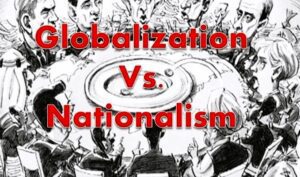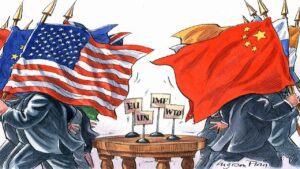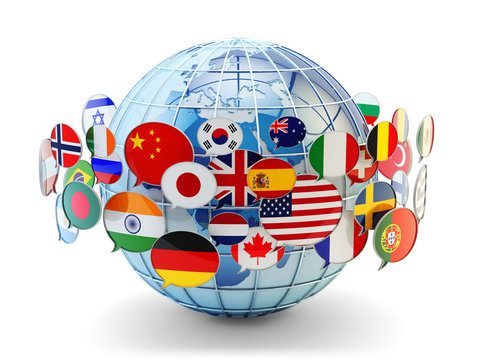Introduction {Can Globalization, Nationalism Coexist}
In the realm of international affairs, the interplay between Can Globalization, and Nationalism Coexist has been a subject of intense debate. At the heart of this discourse lies the query: can globalization and nationalism coexist harmoniously, or are they inherently incompatible ideologies? To delve into this complicated difficulty, it is critical to first recognize the underlying concepts of globalization and nationalism and explore their historical evolution.

Historical Context of Can Globalization and Nationalism Coexist
Origins of Nationalism and Globalization
Nationalism:
Nationalism, the ideology emphasizing the importance of national identity, sovereignty, and cultural historical past, has deep roots in human history. Emerging along the upward push of current nation-states in the 18th and 19th centuries, nationalism fueled actions for independence, self-dedication, and solidarity among ethnically or culturally homogenous groups. It supplied a rallying cry for liberation from colonial rule and the established order of sovereign geographical regions.
Globalization:
Contrary to the famous notion, globalization isn’t always entirely a current phenomenon but has ancient precedents courting lower back centuries. Early forms of globalization may be traced to the Silk Road, the Age of Exploration, and the colonial growth of empires. However, the contemporary generation has witnessed an extraordinary acceleration of globalization, pushed by advances in era, verbal exchange, and transportation. This globalization wave has brought about increased interconnectedness, economic integration, and cultural change on an international scale.
Interplay Throughout History
The courting between Can Globalization, and Nationalism Coexist has been characterized by using tension, cooperation, and mutual impact at some stage in records. While nationalism emphasizes the sovereignty and autonomy of geographical regions, globalization fosters interconnectedness and interdependence among international locations. The following factors illustrate the nuanced interplay among these ideologies:
1. Economic Interdependence:
Globalization has facilitated the enlargement of exchange, investment, and monetary integration throughout borders, blurring the conventional barriers of national economies. While this economic interdependence has led to exceptional prosperity and growth, it has also sparked worries about sovereignty and control over home affairs. Nationalist sentiments often emerge in reaction to perceived threats to nearby industries, jobs, and cultural identity from international economic forces.
2. Cultural Exchange:
The cultural dimensions of globalization have brought about the diffusion of ideas, values, and cultural practices across continents. This cultural exchange has enriched societies with the aid of promoting variety, tolerance, and understanding. However, it has also fueled nationalist actions searching to preserve and defend cultural background from perceived external effects. Debates over cultural globalization versus cultural protection mirror tensions between worldwide and country-wide identities.
3. Political Sovereignty:
Nationalism emphasizes the primacy of the geographical region as the number one unit of political employer, declaring the right to self-governance and autonomy. In comparison, globalization challenges traditional notions of sovereignty using promoting supranational establishments, multinational agreements, and transnational governance mechanisms. The tension between country-wide sovereignty and global governance is clear in debates over issues such as immigration, human rights, and environmental regulation.
The Rise of Globalization
Economic Globalization

Trade Liberalization and Interconnected Markets:
Economic globalization is characterized with the aid of the liberalization of change and the combination of countrywide economies into a global marketplace system. Trade agreements, consisting of the World Trade Organization (WTO) and local free trade agreements, have facilitated the drift of goods, services, and capital throughout borders. This interconnectedness has caused multiplied performance, specialization, and financial increase but has additionally raised concerns approximately process displacement and income inequality.
Multinational Corporations and Supply Chains:
Multinational groups (MNCs) play a relevant role in using financial globalization through their operations across multiple nations. These corporations leverage global delivery chains to optimize production, reduce charges, and gain entry to new markets. While MNCs bring benefits along with process advent and era switch, they also face grievances for exploiting labor, evading taxes, and undermining neighborhood industries.
Technological Globalization
Impact of the Internet and Digital Communication:
Technological advancements, especially the upward thrust of the net and virtual verbal exchange, have revolutionized the way records are accessed, shared, and disseminated globally. The internet has enabled on-the-spot communication, online trade, and social networking, breaking down boundaries of time and area. This digital revolution has democratized access to statistics, empowered people, and facilitated cultural alternate on a global scale.
Access to Information and Cultural Exchange:
The proliferation of virtual generation has democratized access to facts, allowing people to connect to human beings from numerous backgrounds and cultures. Cultural trade thrives via social media, streaming structures, and online boards, fostering an enjoyment of world interconnectedness. However, concerns persist about the homogenization of the way of life and the erosion of neighborhood traditions within the face of dominant international media and leisure industries.
The Emergence of Nationalism
Defining Nationalism
Nationalism is a political ideology characterized by allegiance to 1’s kingdom, frequently followed by using a feeling of pleasure, loyalty, and solidarity with fellow citizens. It emphasizes the importance of countrywide identification, sovereignty, and self-dedication, serving as a unifying pressure in times of crisis or struggle.
Factors Driving Nationalism in the Modern Era
Economic Concerns and Protectionism:
In a technology marked using financial uncertainty and globalization, nationalist actions frequently emerge in reaction to perceived threats to domestic industries, jobs, and economic balance. Protectionist measures, which include rate lists, exchange barriers, and forex manipulation, are seen as a way to shield national hobbies and promote financial self-sufficiency. However, protectionism can also motivate retaliatory measures, trade wars, and financial isolationism, undermining international cooperation and prosperity.
Identity Politics and Cultural Preservation:
Identity politics plays a great role in fueling nationalist sentiments, as individuals seek to keep and guard their cultural and historical past, language, and traditions. In multicultural societies, issues about assimilation, immigration, and cultural homogenization can initiate a backlash against perceived external threats to country-wide identity. Nationalist moves frequently emphasize cultural protection, language revitalization, and historical narratives as symbols of resistance in opposition to perceived globalization pressures.
Conflicting Ideals: Globalization vs. Nationalism
Economic Perspectives
Benefits and Drawbacks of Global Trade:
Globalization has facilitated the growth of world trade, main to accelerated performance, specialization, and economic boom. However, it has also uncovered countries’ dangers which include volatility in global markets, dependence on foreign imports, and vulnerability to financial crises. The debate over loose exchange versus protectionism underscores the anxiety among international economic integration and countrywide sovereignty.
Nationalistic Economic Policies:
Globalization has facilitated the growth of world trade, main to accelerated performance, specialization, and economic boom. However, it has also uncovered countries’ dangers which include volatility in global markets, dependence on foreign imports, and vulnerability to financial crises. The debate over loose exchange versus protectionism underscores the anxiety among international economic integration and countrywide sovereignty.
Cultural Implications
Homogenization vs. Cultural Preservation:
Globalization has brought about the spread of Western cultural norms, consumer products, and media content around the sector, elevating issues approximately cultural homogenization and the erosion of neighborhood traditions. Nationalist moves frequently seek to hold and promote cultural background, language, and identity as symbols of resistance towards perceived globalization pressures. Balancing cultural diversity with cultural exchange is important for fostering mutual expertise and recognition.
Challenges to National Identity in a Globalized World:
In a globalized global characterized by migration, multiculturalism, and cosmopolitanism, conventional notions of countrywide identification are being challenged. Immigration, go-border mobility, and transnational communities blur the bounds of national identification, prompting debates over who belongs and who is excluded. Nationalists are frequently attracted to an experience of belonging and cultural historical past as a response to perceived threats to country-wide identity.
Case Studies: Globalization and Nationalism in Practice
Brexit and the European Union
Brexit:
The selection via the United Kingdom to depart the European Union (EU), referred to as Brexit, exemplifies the tensions between globalization and nationalism. Proponents of Brexit argued for reclaiming sovereignty, controlling immigration, and prioritizing countrywide hobbies over supranational governance. The Brexit method has sparked debates over trade members of the family, border controls, and the destiny of European integration.
Rise of Populism in Various Countries

Populist Movements:
The upward push of populist actions in diverse international locations, characterized by charismatic leaders and nationalist rhetoric, displays a backlash towards globalization and perceived elite dominance. Populist leaders frequently attract grievances over monetary inequality, cultural identity, and immigration, promising to defend country-wide interests and repair sovereignty. However, populist regulations can exacerbate divisions, undermine democratic establishments, and exacerbate social tensions.
Trade Tensions Between Nations

Trade Tensions:
Trade tensions between countries, exemplified by using disputes over tariffs, subsidies, and intellectual belongings rights, replicate the complexities of Can Globalization and Nationalism coexist? in financial members of the family. The United States-China exchange conflict, for example, highlights the clash between economic nationalism and international supply chains. While alternate tensions can also serve home interests in the quick term, they can also disrupt worldwide trade, impede financial growth, and boost geopolitical rivalries.
Challenges and Opportunities
Addressing Economic Inequality
Economic Inequality:
One of the foremost demanding situations inside the generation of globalization is addressing financial inequality, both inside and among international locations. While globalization has contributed to an ordinary monetary boom, it has also exacerbated disparities in wealth, earnings, and possibility. Closing the gap between the rich and the poor requires focused policies that promote inclusive growth, equitable distribution of resources, and get right of entry to to schooling and healthcare.
Balancing National Interests with Global Cooperation
National Interests vs. Global Cooperation:
Finding stability among national hobbies and global cooperation is critical for addressing transnational challenges consisting of weather change, pandemics, and terrorism. While nations ought to prioritize their sovereignty and safety, they also rely upon worldwide cooperation to address shared threats and reap commonplace dreams. Effective multilateralism calls for diplomacy, compromise, and a willingness to interact constructively with different countries.
Harnessing Globalization for Sustainable Development
Sustainable Development:
Globalization gives possibilities for sustainable improvement using promoting economic increase, innovation, and information sharing. Sustainable development desires, along with poverty relief, environmental conservation, and social inclusion, maybe superior via international collaboration and partnerships. Harnessing the blessings of globalization even as mitigating its terrible effects is crucial for building a more equitable and resilient international.
The Role of International Organizations
United Nations and Global Governance
United Nations:
The United Nations (UN) plays a central function in global governance, presenting a platform for international relations, warfare resolution, and collective action. Through its specialized organizations, programs, and peacekeeping operations, the UN addresses a huge range of worldwide demanding situations, from peace and security to human rights and sustainable development. Despite its barriers, the UN remains necessary in fostering cooperation and upholding global norms and values.
Impact of the Internet and Digital Communication:
World Trade Organization (WTO):
The World Trade Organization (WTO) oversees international trade policies and dispute resolution mechanisms, promoting free and fair alternatives amongst its member states. Trade agreements negotiated below the auspices of the WTO intend to lessen exchange boundaries, facilitate the market right of entry, and make certain a stage playing area for businesses. While the WTO has been criticized for its effectiveness and inclusivity, it remains a vital institution for regulating international change family members.
Non-Governmental Organizations and Civil Society
NGOs and Civil Society:
Non-governmental groups (NGOs) and civil society play an important function in worldwide governance using advocating for human rights, social justice, and environmental sustainability. NGOs operate independently of governments, mobilizing public guidance, undertaking studies, and presenting services to marginalized groups. Civil society engagement complements transparency, accountability, and participatory selection-making in international affairs, complementing the efforts of international businesses and governments.
Globalization, Nationalism, and Security
Border Security and Immigration Policies
Border Security:
In a technology marked by globalization and multiplied mobility, border safety has turned out to be an urgent issue for international locations seeking to protect their sovereignty and manage migration flows. Border manipulation measures, including immigration guidelines, visa guidelines, and border fences, goal to prevent illegal immigration, human trafficking, and transnational crime. However, border protection guidelines must stabilize national safety imperatives with humanitarian issues and appreciation of human rights.
National Security:
National protection encompasses a huge variety of threats, including terrorism, cyber attacks, pandemics, and geopolitical rivalries, in an interconnected international. Globalization has converted the nature of safety challenges, blurring conventional limitations and necessitating collaborative responses. Nations have to adapt their safety techniques to deal with emerging threats, construct alliances, and beautify intelligence sharing to shield their interests and protect their citizens.
Terrorism and Transnational Threats
Terrorism:
Terrorism poses a widespread mission to global safety, fueled by way of ideological extremism, political grievances, and social alienation. Transnational terrorist networks, which include ISIS and Al-Qaeda, make the most globalization to recruit, finance, and coordinate assaults throughout borders. Combating terrorism calls for a multifaceted method, along with intelligence cooperation, law enforcement coordination, counter-radicalization efforts, and addressing root causes along with poverty, inequality, and political instability.
Cultural Exchange and Identity
Impact of Globalization on Cultural Exchange

Globalization’s Influence:
Globalization has facilitated exceptional cultural exchange, bearing in mind the spread of thoughts, values, and traditions throughout borders. Through tours, migration, and virtual conversation, humans from various cultures engage, collaborate, and proportion stories, enriching the global cultural range.
National Identity in a Globalized Society
Shifting Notions of Identity:
In a globalized society, countrywide identification undergoes a transformation as individuals navigate a couple of identities fashioned by neighborhood, regional, and worldwide affiliations. While globalization promotes cosmopolitanism and multiculturalism, it additionally increases questions about the preservation of national identity and cultural background in the face of world homogenization.
Preserving Cultural Heritage Amidst Globalization
Cultural Preservation Efforts:
Amidst the forces of Can Globalization and Nationalism coexist, efforts to keep cultural historical past emerge as imperative for shielding groups’ unique identities and traditions. Cultural preservation initiatives, inclusive of UNESCO World Heritage Sites and intangible cultural historical past packages, intend to defend cultural treasures and sell intergenerational transmission of understanding and capabilities.
Environmental Impacts
Globalization’s Role in Environmental Degradation
Environmental Consequences:
Globalization has contributed to environmental degradation through multiplied industrialization, aid extraction, and pollutants. Transnational delivery chains, unsustainable intake styles, and deforestation threaten biodiversity, exacerbate climate trade, and degrade ecosystems, highlighting the want for collective action to cope with worldwide environmental demanding situations.
Nationalist Approaches to Environmental Policy
Nationalist Environmentalism:
Nationalist movements frequently propose environmental safety as a means of safeguarding countrywide assets and preserving cultural heritage. Nationalist environmental rules prioritize home interests over global cooperation, emphasizing sovereignty, self-sufficiency, and conservation of herbal landscapes.
Collaborative Solutions for Global Environmental Challenges
International Cooperation:
Addressing international environmental demanding situations calls for collaborative efforts among nations, companies, and civil society. Multilateral agreements, which include the Paris Agreement on climate alternate, sell shared responsibility, technology switches, and economic assistance to mitigate greenhouse gasoline emissions and adapt to the effects of climate alternate.
Globalization and Nationalism in the Digital Age
Social Media and the Spread of Nationalist Ideologies
Digital Platforms:
Social media structures have become conduits for the unfolding of nationalist ideologies, fostering echo chambers, polarization, and online radicalization. Digital nationalism manifests through identification politics, xenophobic rhetoric, and incorrect information campaigns, amplifying social tensions and undermining acceptance as true within democratic establishments.
Cybersecurity Challenges in a Globalized World

Cyber Threats:
In a digitalized world, cybersecurity threats pose significant challenges to countrywide security and global stability. Cyber attacks, consisting of hacking, espionage, and disinformation campaigns, goal vital infrastructure, government agencies, and private corporations, highlighting the want for robust cybersecurity measures and international cooperation to mitigate cyber dangers.
Digital Diplomacy and International Relations
Diplomatic Engagement:
Digital international relations give new possibilities for attracting international audiences, fostering dialogue, and shaping public opinion on key problems. Digital structures allow governments to behavior digital diplomacy, interact in public international relations campaigns, and promote move-cultural expertise through virtual cultural exchanges and online outreach initiatives.
The Future of Globalization and Nationalism
Trends Shaping the Future Landscape
Emerging Trends:
The destiny panorama of Can Globalization and Nationalism coexist is formed via emerging developments which include technological innovation, demographic shifts, geopolitical realignments, and environmentally demanding situations. These developments influence the dynamics of international members of the family, monetary integration, and cultural change, shaping the contours of worldwide governance and national identity.
Potential Scenarios for Coexistence or Conflict
Scenarios:
The destiny courting between globalization and nationalism could spread in diverse scenarios, ranging from nonviolent coexistence to conflict and fragmentation. Factors along with political management, economic disparities, social concord, and environmental pressures will impact the trajectory of global dynamics and shape the stability between globalization and nationalism.
Strategies for Fostering Harmony Between Globalization and Nationalism
Harmonizing Strategies:
Fostering a concord between Can Globalization and Nationalism coexist requires strategic strategies that cope with underlying tensions and promote shared hobbies. Strategies may additionally consist of promoting inclusive boom, strengthening democratic establishments, improving cultural talk, and advancing sustainable improvement desires to build a more resilient and interconnected international.
Frequently Asked Questions (FAQs)
Can Globalization, and Nationalism Coexist?
What is globalization?
Globalization refers to the interconnectedness and interdependence of nations, economies, cultures, and societies throughout the globe. It encompasses the float of products, offerings, capital, statistics, and those across borders, facilitated through advances in era, transportation, and communication.
How does nationalism influence economic policies?
Nationalism frequently influences monetary guidelines with the aid of prioritizing domestic hobbies over international cooperation. Nationalist monetary rules may also encompass protectionist measures together with price lists, subsidies, and import regulations to safeguard home industries, promote task advent, and protect national sovereignty.
Can nations maintain their cultural identity in a globalized world?
While globalization helps cultural alternate and homogenization, countries can keep their cultural identification through efforts to maintain cultural heritage, sell neighborhood traditions, and foster cultural range. Cultural identity is frequently tied to language, religion, customs, and ancient narratives, which can be upheld amidst globalization.
What are the main challenges to global cooperation?
The principal challenges to international cooperation include geopolitical rivalries, financial disparities, ideological differences, and competing country-wide interests. Other demanding situations include loss of trust, political instability, resource constraints, and the absence of powerful mechanisms for conflict decisions and decision-making.
How do trade wars impact globalization and nationalism?
Trade wars, characterized by price lists, alternate barriers, and retaliatory measures among countries, disrupt global supply chains, undermine financial increases, and amplify tensions between countries. Trade wars mirror nationalist monetary guidelines aimed toward shielding home industries however, they could have unfavorable consequences on international trade and worldwide family members.
What role do international organizations play in mediating between globalization and nationalism?
International organizations, which include the United Nations, World Trade Organization, and International Monetary Fund, play a critical function in mediating between globalization and nationalism with the aid of selling dialogue, cooperation, and collective action on global problems. These organizations provide systems for negotiation, dispute decision, and coverage coordination amongst countries.
Is there a relationship between globalization, nationalism, and populism?
There is a complex courting among globalization, nationalism, and populism. Globalization fosters economic and cultural integration, leading to nationalist backlash and populist actions that appeal to grievances over financial inequality, cultural identity, and sovereignty. Populist leaders regularly take advantage of nationalist sentiments to mobilize help in opposition to perceived elite and outside threats.
How does globalization affect national security?
Globalization influences national protection by reshaping the character of safety threats, increasing interconnectedness, and hard conventional borders and boundaries. Globalization helps transnational crime, terrorism, cyber-assaults, and pandemics, requiring international locations to adapt their protection techniques to address emerging threats and decorate international cooperation.
What are some examples of nationalist movements in recent history?
Recent examples of nationalist moves encompass Brexit inside the United Kingdom, the rise of populist leaders in Europe and the USA, separatist actions in Catalonia and Scotland, and ethnonationalist moves in India and Myanmar. These movements emphasize national sovereignty, cultural identification, and protectionist rules in response to globalization pressures.
How can individuals contribute to a balance between globalization and nationalism?
Individuals can make a contribution to a balance between Can Globalization and Nationalism coexist using selling cultural trade, fostering communication, and advocating for inclusive policies that embrace diversity and respect national sovereignty. Engaging in civil society projects, supporting worldwide cooperation, and embracing worldwide citizenship can help bridge divides and sell mutual know-how in an interconnected world.
Conclusion: Can Globalization, and Nationalism Coexist?
In the end, this dialogue has highlighted the difficult interplay between globalization and nationalism, effective forces shaping the cutting-edge international. We have explored the economic, cultural, and political dimensions of globalization and nationalism, spotting their profound influences on societies, economies, and identities.
Throughout our exploration, it has emerged as evident that the connection between globalization and nationalism is complex and multifaceted. While globalization promotes interconnectedness, monetary integration, and cultural alternate, nationalism emphasizes sovereignty, national identification, and self-dedication.
Finding stability between those competing forces is important for fostering a harmonious and sustainable worldwide order. It calls for cooperation, talk, and compromise among policymakers, communities, and individuals across borders.
As we circulate ahead, policymakers, groups, and people should paint collectively to navigate the challenges and opportunities offered by way of the coexistence of globalization and nationalism. By embracing diversity, selling inclusivity, and upholding shared values, we can construct an extra resilient, equitable, and wealthy global for destiny generations.
Share Your point of view!

